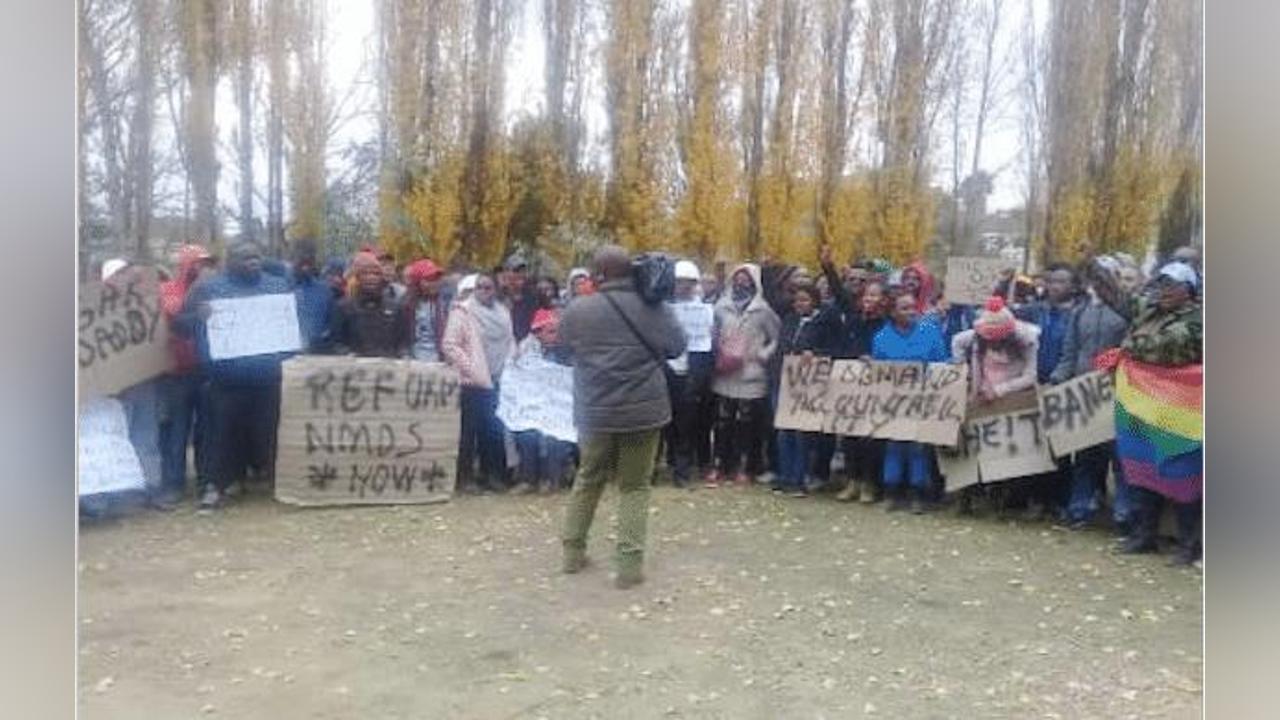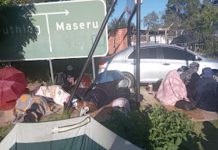Africa-Press – Lesotho. Restive youth are demanding inclusion across all levels of society and even want a say in national budget estimates. Lack of employment opportunities, job insecurity and exclusion in production activities are the main challenges faced by young people when looking for a job in the country.
These are some of the issues they have been up in arms against in recent years urging the government to address. In addition, problems of violence, crime and school dropouts, the youth argue, complicate young people’s chances for future career paths and a better life.
In Lesotho, according to the 2016 census, youth were 794 940 accounting for 39.6 percent of the total population. The breakdown of the numbers include, 403 000, which is 50.7 percent of total youth while female youth constitute 49.3 percent.
About 29.6 percent of the male youth were heads of households while female youths constitute 11.8 percent. Male and female youths that were head of households were in age groups 15-24 and 25-35, at 22.2 and 77.8 percent respectively.
Furthermore, opportunities for young people to access productive and decent work are limited by their short education career and by the mismatch between the training offered and the qualifications required on the labour market.
The country’s youth unemployment rate, according to the International Labour Organisation, was estimated at 33.68 percent in 2019. These statistics have led to several youths participating in protest marches to demand their rights to economic inclusion. Sadly, this has led to confrontation with the police, resulting in the shooting and injury of the disgruntled youth.
Driven by youth grouping, the Transform Lesotho Initiative (TLI), young people have moved to call on all youths to take a stand to restore their dignity by partaking in what is now known as the BachaShutdown movement – a demonstration of their displeasure at the status quo and an exercise of their rights and responsibilities as citizens.
BachaShutdown has this week suggested inclusion in informing the 2022/23 national budget, and proposing areas of focus to finance minister Thabo Sophonea “after government failed to address our plight as the youth, forcing us to take to the streets to voice our displeasure and solicit sympathy.
.
. but in vain.
” BachaShutdown president, Tumelo Moteuli told Public Eye: “The facts are that half of the working population in Lesotho is not participating in the labour market, neither has a job nor is that portion looking for a job, leaving may young people being disproportionally affected by joblessness.
” He further explained that senseless lockdowns imposed by government from March 2020 have had a harsh impact on the employment statistics of the country, worsening the already dire situation that the country was already in.
All these challenges, he said, worsened an already dire situation of numerous businesses that were foreclosed along with the increase in food insecurity. The youth advocacy group has tabulated three main propositions that they strongly believe will eradicate poverty in Lesotho, namely.
In establishing the Youth and Women Fund the youth demand incorporation of funds from the proposed 15 and 30 percent increment of alcohol and tobacco levies.
They argue the levies would amount to M286.6 million in revenue annually, which could be put under the administration of experienced Basotho women for allocation to unemployed youth but not in any way be put under the supervision of politicians.
The youth say this could work for Lesotho, learning from a similar experiences in Botswana which increased such levies and received a cumulative revenue of P1.16 billion by 2013 and P1.441 billion by 2014.
“Considering that Lesotho has 20 percent of daily adult smokers and has one of the highest tobacco consumption in Africa, the increase could really provide a shift in the revenue of the country and could certainly be used to assist unemployed youth,” contends BachaShutdown.
Here the youth plead for the reduction of mandatory tax before the purchase of data bundles by customers. They say the 12 percent tax added has made accessibility of data bundles to be difficult especially for the low income consumers, adding that affordable data could help them start online businesses like e-commerce.
These, the youths say, would help to create jobs that pay higher salaries than average jobs and that internet can be used to access job opportunities that are posted online.
This has become a challenge for many young people because they cannot constantly be online due to the high charges and therefore they miss a lot of opportunities that could potentially improve their lives.
The youth say the introduction of cash grants payable to unemployed Basotho will help government to realise that despite job provision for youth being a long-term goal, it does not solve the immediate problems that unprivileged Basotho face without the means to make ends meet, especially while they wait for any job vacancy to open up.
It would, therefore, provide fast assistance to the poor, alleviate poverty to a small degree if a cash grant could be allocated to them. They cite countries like South Africa where they say such grants have helped bring life to people’s homes, and where some even save from the little that they have to start small businesses.
“A young man in Soweto saved money from his R350 unemployment grant to open an ice-cream shop, he currently employs fellow young people,” they claim.
Within the Southern Africa Customs Union (SACU) countries, Lesotho’s poverty rate is among the highest, driven by a number of factors that are often out of the citizens’ control.
These include an individual’s personal background, health problems, environmental shocks, unemployment, among other contributing factors. According to reports, Lesotho has made gains in poverty reduction over the last decade.
However, poverty remains higher than in neighbouring countries with approximately 49.7 percent of the country’s population living below the poverty line while about one quarter (24.1 percent) lives in extreme poverty.
The Lesotho national poverty rate is measured at the national poverty line of about M650 per adult per month. In absolute terms, this translates to about a million people (994 000) living below the poverty line and an estimated half a million (484 000) living in extreme poverty.
Mordekai Side Bar I LAW KTM ‘Nothing for us without us’ Youth seek presence in enterprise development effort SEKETE LESAOANA MASERU – Youth movement BachaShutdown has written to small business minister, Machesetsa Mofomobe, questioning his ministry about concerns about youths participation in projects speci.
In a letter dated January 25, the movement brought to the minister’s attention the youth’s concern over their exclusion in the current initiative on empowering them to start or improve their businesses through the Basotho Enterprises Development Corporation.
The movement notes that before and during the Youth Job Summit the ministry was well represented, assuming full familiarity with young people’s needs, despite recorded failure to fulfill its obligations to them as a sector.
The letter further reminded the minister that on several occasions the youth have explicitly stated that everything meant to empower young people should be handled by them.
BachaShutdown says the youth are against the youth employment stimulus programme that was introduced by the Office of the Prime Minister’s Accountability Unit, in that the programme is not sustainable and not meant to be led by the youth.
Instead, the pressure group says, rather to consolidate existing failed government youth initiatives across ministries. The youth say they never requested the ministry to act as their custodian as it plans for the youth and not with the youth.
BachaShutdown says the ministry deceives international partners as it focuses on activities that can be televised while booking expensive accommodation and spending a lot of scarce financial resources on beverages.
In the letter, the ministry is accused of being inconsistent with what it preaches, discriminatory and negligent – while it targets literate youth who can articulate their intentions in writing not verbally.
While responding to these claims in an interview with Public Eye, Minister Mofomobe said he does not work on ultimatums as the movement had given him just five working days to respond to the letter.
Mofomobe said the youth were made aware of all the activities that included them, inclusive of a business competition that has been running “unless BachaShutdown, as a movement, wants special treatment when it comes to the way things are done.
“We launched the business plan competitions so that it is seen by all people within the required age.
I even went to the point of asking the CEO at BEDCO to extend the competition entry timelines to allow more people to participate and they heeded the call and participated,” Mofomobe said.
The minister also assured the movement that he will reply to the queries contained in the letter at the right time but made it clear he will not act like he is being held at gun point by the movement.
BachaShutdown has forwarded recommendations that the Ministry should stop the competition and focus on solutions presented by the in-district and the first phase of the Youth Job Summit; while also rendering a plea to engage while planning, starting on the day the minister received the letter
Mordekai Side Bar II LAW KTM Youth stand up to government KENEUOE NKUATSANA MASERU – Bachashutdown movement members in January took to the streets to highlight the reality of youth unemployment in the country – clad in their academic graduation regalia.
Maseru City Council (MCC) officials attempted to order the protesting unemployed graduates off the streets arguing that they were obstructing traffic. MCC Public Relations Officer, ’Makatleho Mosala, however, said the youth were not targeted on the day.
Instead, she said that the municipal officers were doing their duty as the demonstrating youth were blocking businesses belonging to authorised street vendors and that the officers’ action was a mere response to a complaint lodged by the vendors.
On the contrary the movement’s chairperson, Thuso Leina, said surprisingly street vendors were delighted to buy from them supporting their demonstration.
“The fact that the other street vendors buy from us is proof that the unemployment pandemic has not only affected us alone as the youth.
Everyone has in some scale been a victim of this dilemma so the government needs to attend to this matter urgently,” he added. The youth wore their academic regalia, demonstrating to push the government to prioritize the youth in its employment creation efforts. The demonstration took place for three consecutive days with graduation gowns-clad unemployed youth selling merchandise in the streets of Maseru.
The exercise was initially planned to take place every first Monday of the month nationwide to make a statement for the government to realise that youths intend to create their own employment since authorities have failed to heed their request for cordial discussions with regard to employment creation.
The youth wanted the government to declare unemployment as a state of emergency in Lesotho, an issue that should be taken as a priority and be addressed with immediate effect.
The second announcement the youth wanted to make was for the government to help broaden the spectrum of courses sponsored for study outside the country.
Leina said, “Some youth like myself find themselves having to study what they do not really like but end up opting for such courses only because they are the only ones government sponsors.
Youth president, Tumelo Moteuli said, “It has not only come across as a dilemma to Lesotho but to other countries as well, making it the number one issue to be addressed globally.
“It has fortunately been a proven hypothesis that countries that have invested more in their youth are flourishing economically therefore if Lesotho wishes to one day realize sound economic growth it must invest in its youth as well.
The BachaShutdown movement collectively stands on its motto – “Nothing for the youth without the youth” – which they say urges youth involvement in projects that empower them.
The youth have the ability, education and skills to carry out these tasks that the government wants to do for them (youth). Therefore, it would be effective and economically wise to task the youth in different projects, Moteuli said.
BachaShutDown was established on June 16, 2020, with the primary objective of bringing awareness to the government of Lesotho for its neglect of the needs of youths.
The movement has previously met with Prime Minister Moeketsi Majoro to plead with him to declare youth unemployment a crisis that needs special attention but that was in vain. They later met with the Minister of Gender, Youth, Sports and Recreation, Likeleli Tampane, asking her to assist the youth to create employment.
Both efforts have been deemed useless because nothing was ever done, leading to the decision to launch the demonstration dubbed “Unemployed youth graduates week” to grab the public and government’s attention.
This week a delegation of BachaShutdown met with UNDP, whose attention was attracted by the demonstration. Moteuli told Public Eye “the UNDP saw us when we were selling merchandise on the streets in our academic regalia and they were interested to find out the reason behind that.
He further explained that they were curious about what the movement stood for, asking if there was anything that they could do to help the youth in their dilemma.
Moteuli said the meeting ended with a promise from the UNDP that they will sit down to assess the youth pleas and consider if there is any form of help that they could render.
For More News And Analysis About Lesotho Follow Africa-Press






